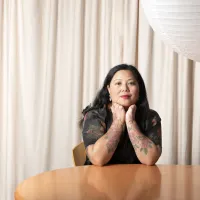Lesson Introduction
Reconciliation cannot take place before awareness, and the feelings of commonality and connection. Reading poetry by Indigenous poets, such as Liz Howard and Alootook Ipellie, we can grow in our awareness of the lives and issues faced by various First Nations, Metis and Inuit groups.
Through these lessons, students will become familiar with different Indigenous poets, the issues they face due to colonization, and their resistance.
Learning Objectives
- Become familiar and develop an interest in Indigenous poets and their poetry
- Become familiar with different First Nations, Metis and Inuit groups ie. geographical location, customs, spirituality
- Identify a variety of issues faced by our First Nations, Metis and Inuit peoples
- Develop an understanding of the interconnectedness of all beings expressed by various Indigenous poets
- Develop an understanding for the need for Indigenous sovereignty and self-governance
Materials and Resources
- Joshua Whitehead’s “Full Metal Oji-Cree”
Irene Zhang’s recitation of Full Metal Oji-Cree
- Liz Howard’s “1992”
- Alootook Ipellie’s “Walking Both Sides of an Invisible Border”
- Billy-Ray Belcourt’s “If Our Bodies Could Rust, We Would Falling Apart”
- Jordan Abel’s poem “Injun”
- Marie Annharte Baker “Saskatchewan Indian’s Were Dancing”
- Kateri Akiwenzie-Damm’s “Sturgeon”
- Jessica Johns’ “How Not to Spill”
- Lee Maracle’s “War”
- Leanne Betasamosake Simpson’s “i am graffiti”
- Jaye Simpson’s “urban NDNs in the DTES”
- Print out Appendix A and B
- highlighters,
- various writing materials (pens, pencils)
- technology ie. iPad, laptops
